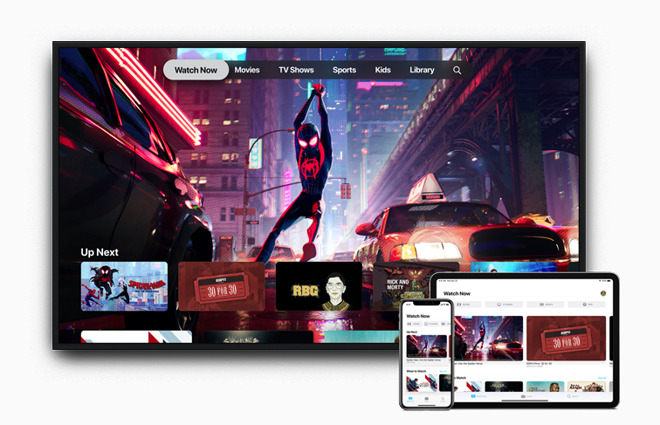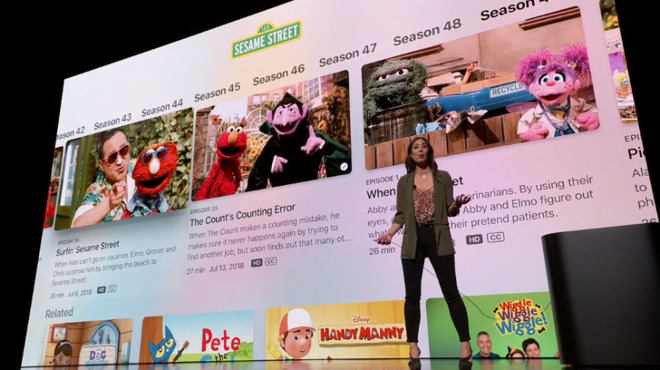Editorial: The new Services -- Why Apple created Apple TV+
Apple's announcement of series of original new content projects for its upcoming Apple TV+ subscription service raises two questions: why would Apple want to be in that business, and why didn't it just acquire Netflix, the established leader in that space?

The Apple TV app lets viewers subscribe to Channels, and soon, TV+
Apple's Services revenue is growing faster than most of its hardware segments. It's also generating higher margins: Apple just reported an overall gross margin of 38% in its March quarter, but a 62.8% gross margin in Services. It's very expensive to develop original programming, yet once you do, you can license copies of it at little additional cost, making it a business that scales up extremely well once you have an established audience.
In contrast with its other new Services, Apple TV+ aims to establish the company as a producer of original content, rather than being merely a curator of others' talent, as it largely has been in iTunes and the App Store and as it intends to be with Apple Arcade video games and News+ periodicals.
With Monday's release of tvOS 12.3, Apple's existing TV app now works similar to its News app in that it allows viewers to individually subscribe to a variety of video service Channels, including HBO, Starz, SHOWTIME, Smithsonian Channel, EPIX, Tastemade, and MTV Hits. But rather than doing its own cable bundle the same way News+ offers a package of +300 magazines for a monthly subscription, the upcoming TV+ subscription service will feature original content produced by Apple.

Cindy Lin, director of program management, demonstrates the new Apple TV app
In many ways, Apple TV+ is a lot like the video version of Apple Music. Apple launched its streaming Music service in response to consumers' shift away from iTunes music downloads, lead by the popularity of Spotify. The new Apple TV+ is a similar move to follow the shift in demand from movie downloads or rentals to the all-you-can-eat video streaming plan popularized by Netflix.
Spotify wasn't profitable across 13 years of trying. It finally reported a profitable quarter at the end of 2018, earning $104 million (94 million Euros), but then lost 41 million Euros ($46 million) in the March quarter across its 100 million paid music subscribers. Across 2019, it expects to lose 2-3 times as much as it earned in the December quarter.
In its March quarter, Netflix reported profits of $344 million but free cash flow of negative $460 million. It's now $12 billion in debt and spending another $12 billion annually to produce more new original content just to stay alive.
It appears Apple launched Apple Music and its upcoming TV+ subscriptions to stay relevant in content. It similarly originally entered the music downloads business with iTunes, not to make vast profits, but to ensure that recorded music would remain available to users of Macs and iPods in a format Apple could control.
If Apple had delegated music download sales to Microsoft or Sony twenty years ago, it would have been forced to follow their lead in creating hardware capable of playing whatever formats and DRM schemes those vendors chose to support. By making its own content delivery deals with labels, Apple could sell iTunes music in AAC and eventually negotiate DRM-free sales, clearly differentiating its products from efforts to lock down music by Microsoft and Sony.
Apple's position with iTunes later enabled it to distribute movie downloads and rentals using MP4 H.264, and optimize playback for this format on its mobile hardware. Without the iTunes Store moving huge volumes of media sales, Apple would have been forced into adopting Microsoft's WMP or Adobe Flash video distribution, with support not only built into its software but also in its custom silicon.
Imagine how popular iPhone would have been if there were no iTunes and Microsoft had refused to deliver its music and movies for it. Instead, Apple could refuse to support WMP and Flash and deliver products that were substantially better because of it.

Without iTunes, Apple's hardware wouldn't have been able to innovate in many key directions
Netflix already did with its interactive "Bandersnatch," a "choose your own adventure" title that the company didn't support on Apple TV. Netflix's vice president of product Todd Yellin shrugged off its lack of Apple TV support, stating, "almost every single Netflix household has a device that can play Bandersnatch."
Netflix has also dropped out of Apple's App Store subscriptions, ended support for AirPlay streaming and opted out of integrating with Apple's TV app (it plays only through its own Netflix app on tvOS and iOS). It's certainly not the first time a content producer has purposely withheld its content from Apple devices in an offensive move.

Netflix moved to exclusive proprietary content because commodity programing is available anywhere
In 2010, Facebook initially refused to put its app on iPads and pulled out of its social network collaboration with Apple's iTunes Ping. The social network also pursued a cross-platform mobile app strategy that snubbed Apple's native iOS platform before realizing that was a grave mistake.
Google's Android made exclusive snubs to iOS in Maps, Assistant and elsewhere; Amazon's Fire Phone, its federal case punishing Apple for daring to compete in ebooks, and its temporary refusal to sell Apple TV units; and most famously Microsoft's efforts to backstab the Mac, kill iPod, laugh off iPhone, and disparage iPad as 'just a media device without a "real" operating system'-- all continued until those companies realized that they had to come groveling back and admit that they really did desperately need Apple's business because iOS is so critically important among their users.
Apple is currently forcing third parties-- including Amazon, Facebook, Google, Microsoft, Netflix, and Spotify-- to support its platforms simply by being so big and important. But it can't let up because as soon as Apple loses any relevance, those partners will turn on it the same way that each of them earlier did as soon as they thought they could.
This role was originally performed by iTunes, then maintained by the popularity and exclusivity of apps developed for the iOS App Store. Rather than needing to knock Spotify and Netflix out of business, Apple only has to compete for their attention so that its installed base of users isn't pulled away to a new platform.
That's also why Apple doesn't need to worry that Google Maps has features that Apple Maps doesn't. Users who prefer Google's services, such as Assistant or Maps, can use them on iOS. But the default option is to use Apple Maps and Siri, and most people do. Similarly, Apple even promotes the availability of Microsoft Office on iPads and Macs alongside its own productivity apps. And it loves to participate in the success of Spotify and Netflix.
Yet if any of those alternative services grow unchecked by Apple's own offerings, they will quickly turn into problems that threaten the importance of Apple's platforms. Apple's plans to spend multiple billions of dollars over the next few years on original episodic television for its new TV+ service is a cost-effective way to strengthen the value of its platforms and make its own TV app the center of whatever content its users want to stream, even if that also includes original content from Netflix, Hulu, Disney, HBO, and other streaming services.
But why is Apple starting from scratch rather than simply using its huge pile of cash to snap up Netflix? The next article examines that.

The Apple TV app lets viewers subscribe to Channels, and soon, TV+
Services as software: Apple TV+
The new Services that Apple announced at its March Event are, effectively, software applications that can turn a profit on ongoing revenues while also attracting and retaining an ever-larger audience to Apple's hardware platforms.Apple's Services revenue is growing faster than most of its hardware segments. It's also generating higher margins: Apple just reported an overall gross margin of 38% in its March quarter, but a 62.8% gross margin in Services. It's very expensive to develop original programming, yet once you do, you can license copies of it at little additional cost, making it a business that scales up extremely well once you have an established audience.
In contrast with its other new Services, Apple TV+ aims to establish the company as a producer of original content, rather than being merely a curator of others' talent, as it largely has been in iTunes and the App Store and as it intends to be with Apple Arcade video games and News+ periodicals.
With Monday's release of tvOS 12.3, Apple's existing TV app now works similar to its News app in that it allows viewers to individually subscribe to a variety of video service Channels, including HBO, Starz, SHOWTIME, Smithsonian Channel, EPIX, Tastemade, and MTV Hits. But rather than doing its own cable bundle the same way News+ offers a package of +300 magazines for a monthly subscription, the upcoming TV+ subscription service will feature original content produced by Apple.

Cindy Lin, director of program management, demonstrates the new Apple TV app
In many ways, Apple TV+ is a lot like the video version of Apple Music. Apple launched its streaming Music service in response to consumers' shift away from iTunes music downloads, lead by the popularity of Spotify. The new Apple TV+ is a similar move to follow the shift in demand from movie downloads or rentals to the all-you-can-eat video streaming plan popularized by Netflix.
Apple TV+ as a defensive play
Why would the notoriously profitable Apple, which is generating incredible cash flow every quarter, want to be in businesses of music and video streaming, which involve high costs and razor-thin margins?Spotify wasn't profitable across 13 years of trying. It finally reported a profitable quarter at the end of 2018, earning $104 million (94 million Euros), but then lost 41 million Euros ($46 million) in the March quarter across its 100 million paid music subscribers. Across 2019, it expects to lose 2-3 times as much as it earned in the December quarter.
In its March quarter, Netflix reported profits of $344 million but free cash flow of negative $460 million. It's now $12 billion in debt and spending another $12 billion annually to produce more new original content just to stay alive.
It appears Apple launched Apple Music and its upcoming TV+ subscriptions to stay relevant in content. It similarly originally entered the music downloads business with iTunes, not to make vast profits, but to ensure that recorded music would remain available to users of Macs and iPods in a format Apple could control.
If Apple had delegated music download sales to Microsoft or Sony twenty years ago, it would have been forced to follow their lead in creating hardware capable of playing whatever formats and DRM schemes those vendors chose to support. By making its own content delivery deals with labels, Apple could sell iTunes music in AAC and eventually negotiate DRM-free sales, clearly differentiating its products from efforts to lock down music by Microsoft and Sony.
Apple's position with iTunes later enabled it to distribute movie downloads and rentals using MP4 H.264, and optimize playback for this format on its mobile hardware. Without the iTunes Store moving huge volumes of media sales, Apple would have been forced into adopting Microsoft's WMP or Adobe Flash video distribution, with support not only built into its software but also in its custom silicon.
Imagine how popular iPhone would have been if there were no iTunes and Microsoft had refused to deliver its music and movies for it. Instead, Apple could refuse to support WMP and Flash and deliver products that were substantially better because of it.

Without iTunes, Apple's hardware wouldn't have been able to innovate in many key directions
Controlling its own technology
As music and movies shifted from individual downloads to ongoing subscription streaming, Apple had to follow because the alternative would revert control of streaming technologies to third parties. If streaming shifted mainstream media consumption to Spotify and Netflix, Apple would eventually face commodity issues where everyone can watch Netflix and listen to Spotify from any device. Further, Spotify and Netflix might even begin prioritizing playback on non-Apple devices.Netflix already did with its interactive "Bandersnatch," a "choose your own adventure" title that the company didn't support on Apple TV. Netflix's vice president of product Todd Yellin shrugged off its lack of Apple TV support, stating, "almost every single Netflix household has a device that can play Bandersnatch."
Netflix has also dropped out of Apple's App Store subscriptions, ended support for AirPlay streaming and opted out of integrating with Apple's TV app (it plays only through its own Netflix app on tvOS and iOS). It's certainly not the first time a content producer has purposely withheld its content from Apple devices in an offensive move.

Netflix moved to exclusive proprietary content because commodity programing is available anywhere
In 2010, Facebook initially refused to put its app on iPads and pulled out of its social network collaboration with Apple's iTunes Ping. The social network also pursued a cross-platform mobile app strategy that snubbed Apple's native iOS platform before realizing that was a grave mistake.
Google's Android made exclusive snubs to iOS in Maps, Assistant and elsewhere; Amazon's Fire Phone, its federal case punishing Apple for daring to compete in ebooks, and its temporary refusal to sell Apple TV units; and most famously Microsoft's efforts to backstab the Mac, kill iPod, laugh off iPhone, and disparage iPad as 'just a media device without a "real" operating system'-- all continued until those companies realized that they had to come groveling back and admit that they really did desperately need Apple's business because iOS is so critically important among their users.
Apple is currently forcing third parties-- including Amazon, Facebook, Google, Microsoft, Netflix, and Spotify-- to support its platforms simply by being so big and important. But it can't let up because as soon as Apple loses any relevance, those partners will turn on it the same way that each of them earlier did as soon as they thought they could.
Netflix in chill
In a world where Netflix is uniquely creating compelling, original content that it chooses to distribute in proprietary formats that may exclude Apple's platforms in the future, it's pretty important for Apple to have its own proprietary supply of content that keeps users interested in its hardware and pressuring Netflix to support it.This role was originally performed by iTunes, then maintained by the popularity and exclusivity of apps developed for the iOS App Store. Rather than needing to knock Spotify and Netflix out of business, Apple only has to compete for their attention so that its installed base of users isn't pulled away to a new platform.
That's also why Apple doesn't need to worry that Google Maps has features that Apple Maps doesn't. Users who prefer Google's services, such as Assistant or Maps, can use them on iOS. But the default option is to use Apple Maps and Siri, and most people do. Similarly, Apple even promotes the availability of Microsoft Office on iPads and Macs alongside its own productivity apps. And it loves to participate in the success of Spotify and Netflix.
Yet if any of those alternative services grow unchecked by Apple's own offerings, they will quickly turn into problems that threaten the importance of Apple's platforms. Apple's plans to spend multiple billions of dollars over the next few years on original episodic television for its new TV+ service is a cost-effective way to strengthen the value of its platforms and make its own TV app the center of whatever content its users want to stream, even if that also includes original content from Netflix, Hulu, Disney, HBO, and other streaming services.
But why is Apple starting from scratch rather than simply using its huge pile of cash to snap up Netflix? The next article examines that.



Comments
Conversely, Apple cares about its own platforms, and wants Netflix on it -- but it also wants Netflix contributing to its platforms.